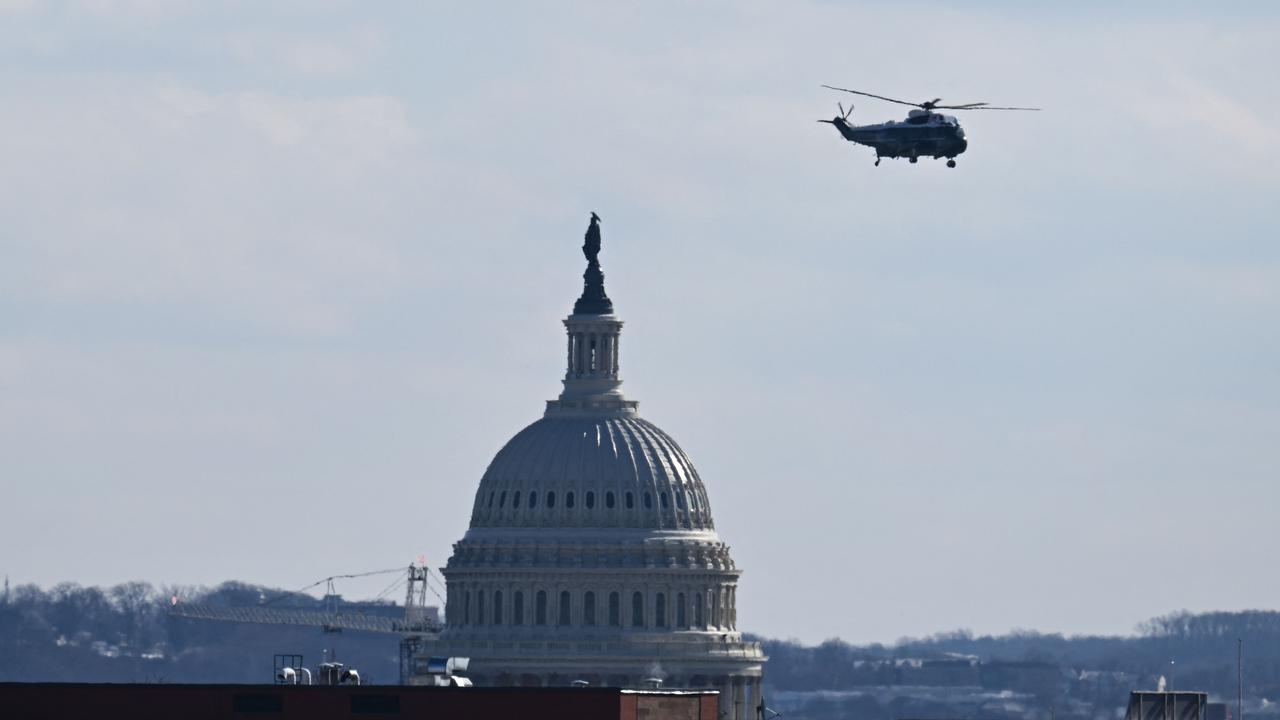NZ election: Jacinda Ardern vows unity as she wins historic majority
Jacinda Ardern has vowed to work for all New Zealanders and unite the country as she wins an outright majority in a historic first.
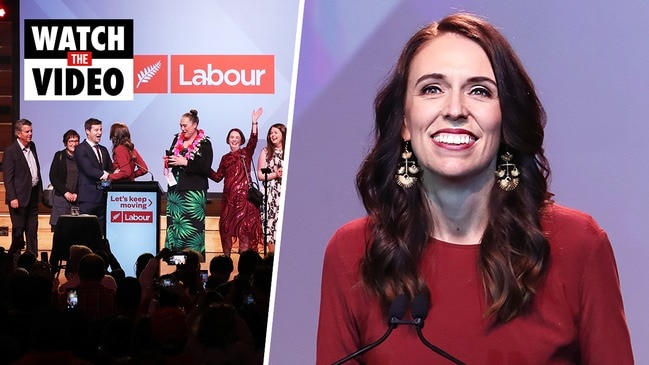
- ‘We’ll bring NZ together’
- Collins concedes defeat
- Ardern set for landslide
- Early exit polls give Ardern wide lead
Our rolling coverage of the NZ election is now finished, with Jacinda Ardern winning resoundingly. The NZ PM vowed unity while National leader Judith Collins was gracious in defeat.
Craig Greaves 9.15pm: Historic win for unifying Ardern
For well over two months, the outcome of New Zealand’s 2020 general election was looking pre-determined.
Jacinda Ardern’s Labour Party was widely expected to be comfortably returned to power for a second term.
In the end, it all panned out even better than forecast as Labour cantered to a landslide win.
Pre-election polling rang true as New Zealand voters in massive numbers rewarded the popular Ms Ardern for her handling of the COVID-19 crisis – the central issue in this election – with another stint in office.
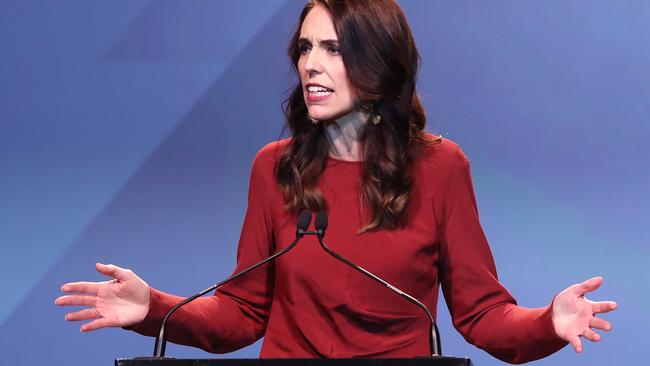
In what was a massive affirmation for the progressive vote, the incumbent prime minister eased her Labour Party to a mammoth win over its nearest rival, the Judith Collins-led opposition National Party, and is now widely expected to establish Labour-Green rule across the land.
Ms Ardern indicated in her victory speech that she will seek to govern from the centre.
Ms Ardern told a rapturous and large crowd at Labour Party’s election HQ in Auckland that New Zealand had shown the Labour Party its greatest support in at least 50 years.
In her victory speech, she spoke to new Labour supporters – of which there were many – thanking them for their support.
Ms Arden assured the country that Labour “will be a party that governs for every New Zealander”.
She noted that the party’s support was shown across the country – in both urban and rural electorate, “in seats they hoped for, but didn’t expect”.
The Prime Minister also assured the country that Labour would govern as they campaigned:
“Positively with optimism about our future.”
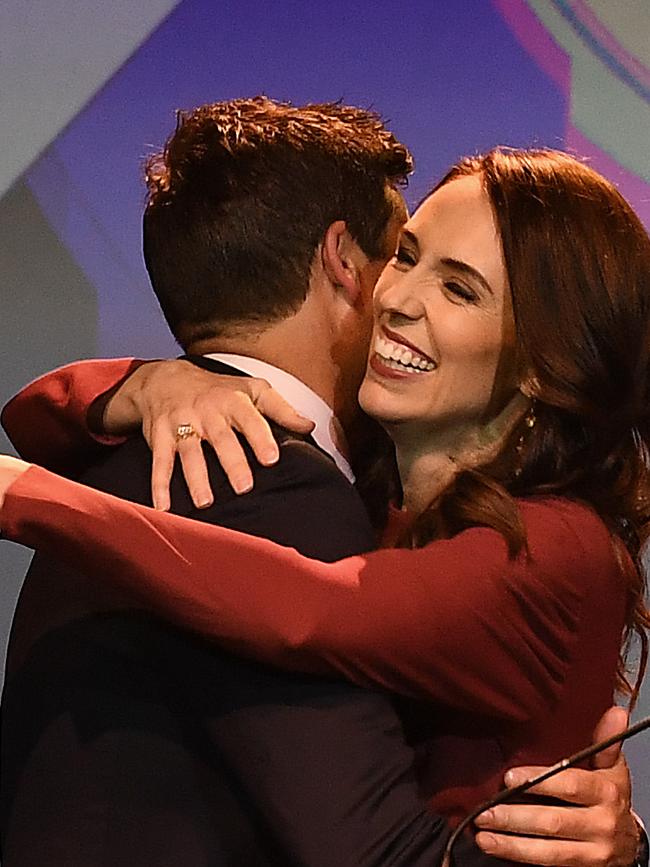
More people have lost the ability to see everyone’s view, but hopefully this election shows that this isn’t who we are as a country, she said.
“New Zealanders can listen and debate, we’re too small to lose sight of other perspectives.”
She acknowledged that the 2020 election “has not been an ordinary election, and it’s not an ordinary time”.
“It’s been full of uncertainty and anxiety and we set out to be an antidote for that.”
There’s a lot of work to do in the next three years, and that includes bouncing back from the Covid-19 pandemic, she said.
“This is our opportunity to build an economy that works for everyone, to keep creating decent jobs … to take on poverty and inequality, to turn all of the uncertainty and hard times into cause for hope and optimism.”
Ms Ardern repeatedly struck aspirational notes throughout her speech.
The next few years might not be easy, she said, but notes that “light has always shone through in the form of determination and support”.
“That light has always been more powerful than the most overwhelming darkness.”
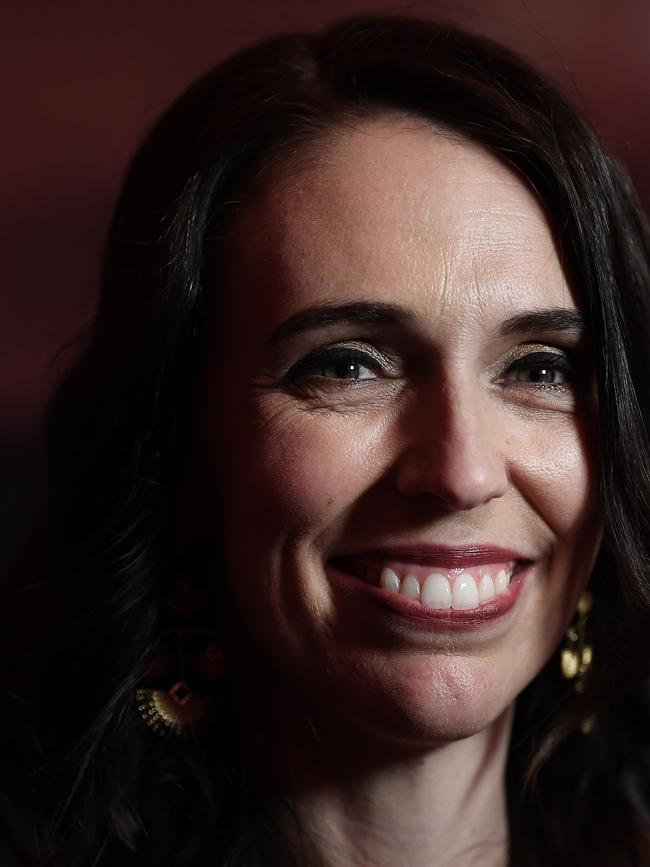
With nearly 92 per cent of the total votes counted, Labour is set to gain 49 per cent of the vote, giving it 64 seats in parliament, while National took home 27 per cent and 35 seats.
In New Zealand’s 120 seat parliament, Ms Ardern needed to win 61 seats to govern outright.
But it was a bloodbath for National, which has lost 20 MPs. Its vote imploded and some senior party MPs, including deputy leader Gerry Brownless, were among those who lost long-held seats, with only their high position on the party list saving them from a humiliating parliamentary exit.
The party will lose a great deal of ground in the next parliament, taking years to recover.
But for Labour, it was an incredible evening and the party won its greatest share of support in 50 years. It flipped safe National seats across the country in urban electorates as well as historical strongholds.
The country has now turned red, and Ms Ardern has a very strong political mandate for at least the next three years – possibly more given the size of her victory.
Labour’s tally of seats exceeded the 61 needed to form a government on its own.
Though Ms Ardern tonight refused to be drawn on whether she will form a government with the Greens, she is widely expected to do so.
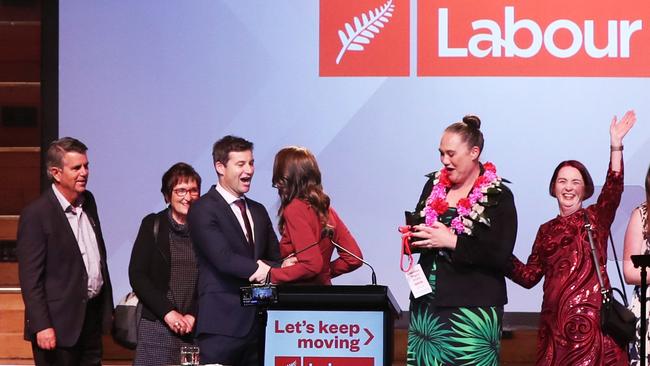
The Greens won 7.6 per cent of the vote and will take up 10 seats.
Labour will, of course, be able to count on the support of the Green Party – a reliable Labour ally and current government support party.
Green Party’s co-leader Marama Davidson tonight proclaimed that “New Zealanders want a strong and truly progressive government”.
ACT, a right wing libertarian party and National ally, also had a great night. The party, led by its sole MP David Seymour, following on from its good form in pre-election polling to win 8 per cent gave it, like the Greens, 10 seats in the next parliament.
The Maori Party is also tracking to pick up one of the Maori seats.
Ms Collins ands her party aside, the other big loser of the night was deputy prime minister Winston Peters and his New Zealand First party.
As widely predicted, even by fatalistic yet realistic members of his own party, the election was an electoral wipeout for his New Zealand First Party.
The current government coalition partner, who had struggled in the polls throughout the campaign, fell well short of the 5 per cent threshold to win a place in parliament after pickin up just 2.6 per cent.
Despite his party’s crushing results, 75-year-old Peters remained upbeat and would not be drawn on what the future holds for him and his party.
In true Peters form, he tonight said that the country “will have to wait and see” what he will do next.
Peters said his party was proud to have questioned authority, and “that force is still needed”.
But, voters clearly rejected his brand of politics and it is hard to see new constituency forming in sufficient numbers before the next election three years hence.
On the night, Labour took a large early lead and never looked back. By 8pm (NZT) that had solidified, with predictions showing a clear pathway to a landslide electoral victory for the party.
The official election results – including special votes, such as those cast overseas and by people outside their home constituency – will not be known until November 6.
Tonight, however, was Labour’s night. It was one of the best the party has ever had in its 104-year history and cemented Ms Ardern as one of the most successful leaders in New Zealand’s modern political history.
How NZ election night unfolded
Craig Greaves 8.45pm: Collins gracious in defeat
With her husband and son standing behind her, National Party leader Judith Collins publicly threw in the towel in what has been massive defeat for her party at the hands of the incumbent Labour Party.
Ms Collins congratulated Jacinda Ardern on an “outstanding result” for the Labour Party.
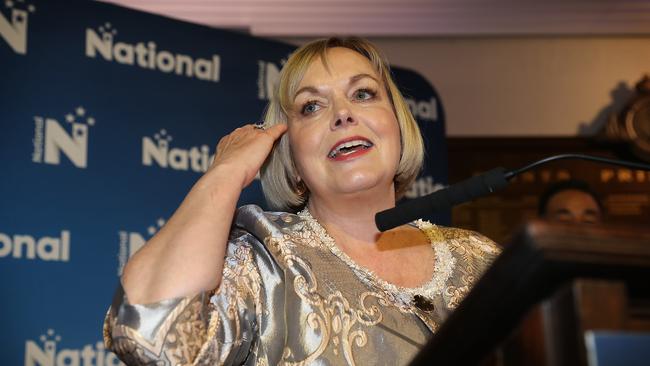
Amid much gallant cheering from the gathered party faithful, Collins said her party’s volunteers coped with everything that was thrown at them, including the COVID-19 lockdowns.
“Boy, did we know it was going to be tough. But you kept the faith,” she told supporters.
Ms Collins acknowledged the reality of the result and said that party will take time to reflect. “We will review and we will change,” she promised.
She promised that her party will be a robust opposition.
Ms Collins warned New Zealand was in for a “tough economic ride and it is going to need better for fiscal policy than we have so far seen”.
She also assured National will remerge from this loss “a stronger, disciplined and more connected party”.
“Tonight is the start of the next campaign, bring on 2023,” she concluded.
“We will be back”, she proclaimed as she ended her short, but graceful speech.
Anne Barrowclough 8.35pm: ‘We’ll bring NZ together’
Jacinda Ardern is giving her victory speech, stressing that her party will be one of unity over the next three years, “In a world where people have lost the ability to see each other’s point of view.” She said Labour would be a party “for all New Zealanders”
“We are too small to lose sight of other people’s perspective,” she told supporters. “Elections are not great in bringing people together but they don’t need to tear one another apart.”
Anne Barrowclough 8.00pm: Collins concedes defeat
Judith Collins has conceded defeat, promising supporters: “The next three years will give us the opportunity to repay your trust.”
Ms Collins said she had phone Jacinda Ardern to concede defeat, acknowledging Labour’s victory was historic.
After arriving to loud applause at her party’s election night party, she told supporters: “Anyone would have thought we’d won.
She added: “We always knew it was gonna be tough, didn’t we?”
Craig Greaves 7.45pm: Dignified Peters silent on future
Winston Peters has emerged to give a short but upbeat speech to his supporters at the NZ First election HQ in the township of Russel.
He started by expressing gratitude to all those who voted for New Zealand First – which as results indicate wasn’t many.
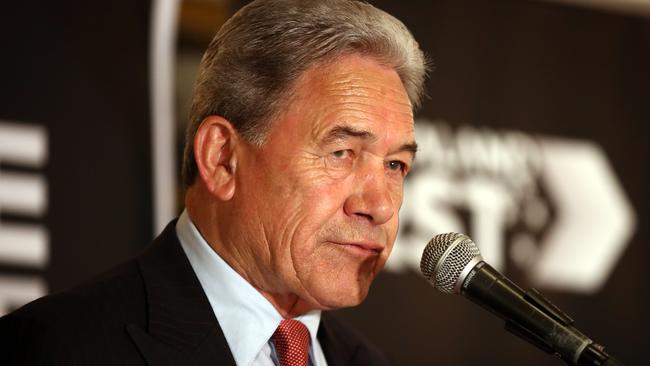
The ‘surge’ in support he hoped for never came as his party struggle to get beyond 3 per cent of the party vote.
He said the economic crisis he predicted in 2017 has arrived, but “the nature of the crisis was not well understood”.
He congratulated tonight’s winners, without naming them.
He failed to mention next steps for himself or his flailing party.
“You’ll all have to wait and see”, he said.
But he did state that his party questioned authority and “that force is still needed”.
Though he never conceded the election, it all but sounded like the makings of one.
“God bless you and God bless New Zealand”, he ended his remarks.
Anne Barrowclough 7.35pm: ‘I can’t think of worse night for National’
Former National Party leader Simon Bridges has said he can’t remember a worse election night for the party he joined as a teenager.
Mr Bridges, told TVNZ: “I’ve been a member of this party since I was 16
“Some National members are happy but I can’t possibly think of, bar 2002, a worse night on the numbers. Really Grim.”
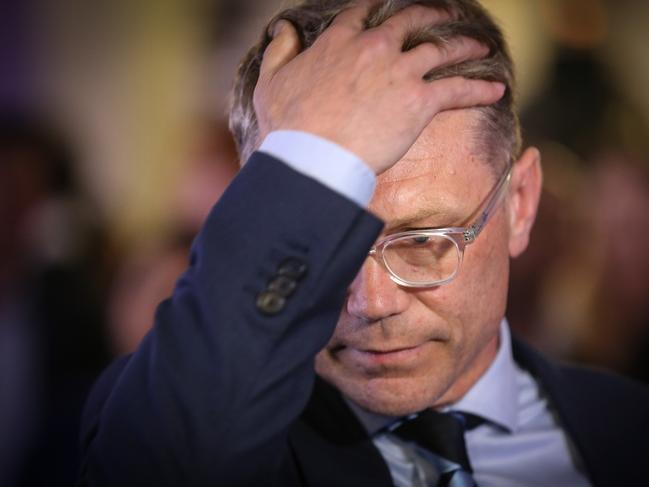
Mr Bridges was rolled as party leader in May this year, but his successor Todd Muller lasted only two months before he was replaced by Judith Collins. Mr Bridges refused to say whether his party would have done better under his leadership.
Craig Greaves 7.25pm: Collins misses election target badly
With 49.1 per cent of results tallied, Labour is at 49.8 per cent (65 seats), National at 26.4 per cent (35 seats), the Green Party at 7.9 per cent (10) ACT with 7.8 (10) and NZ First at 2.4 (no seats).
It’s worth noting that National leader Judith Collins set her party’s target at 35 per cent during the campaign.
Craig Greaves 7.17pm: Greens: ‘We did it!’
The Green Party’s co-leader Marama Davidson has taken the stage at Green Party election HQ to applause from supporters.
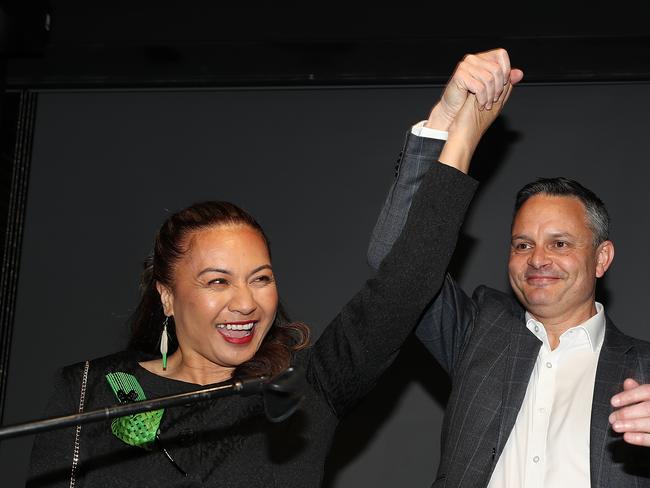
With co-leader James Shaw beaming behind her, Ms Davidson said: “I am so proud to be standing here tonight”.
She also congratulated Jacinda Ardern and Labour for “an extraordinary win”, before claiming that “New Zealanders want a strong and truly progressive government”.
“We did it!” exclaimed Davidson.
Craig Greaves 7.10pm: Curtains for NZ First and Peters
Cabinet minister and NZ First candidate for Northland, Shane Jones, has all but conceded that race. National’s Matt King and Labour’s candidate Willow Prime are in a close battle for the seat, well ahead of Jones.
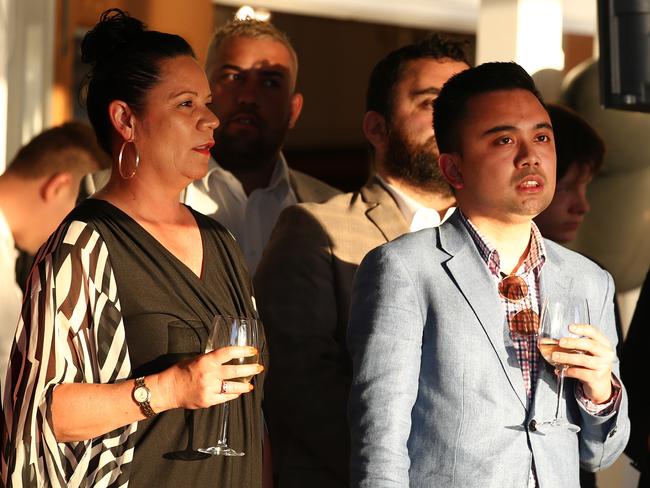
Northland was NZ First’s last, best hope for winning a seat.
With NZ First still polling below the 5 per cent threshold needed to get back in parliament with the buffer of winning a seat, this pretty much means the end of the road for the party of Winston Peters.
Mr Peters always counted on a “late surge” in the party vote across the line. But this scenario is looking more distant by the hour.
Craig Greaves 7.05pm: Right wing ACT to be serious force
ACT supporters are experiencing an invigorating night as their right wing party lifts its party vote to become a serious force in the next parliament.
Buoyed by his party’s success, leader and its current sole MP David Seymour was the first party leader to address supporters.
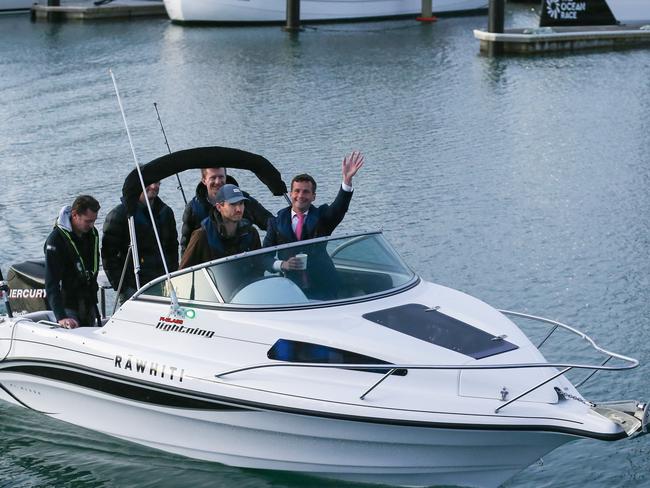
He told the party faithful that his party was for every New Zealander.
“Because as the world has changed, this small island has to adapt,” Seymour said, referring to Covid-19.
Mr Seymour noted his new MPs – set to rise to 11 in the next parliament – would not just oppose legislation but propose new ideas also.
ACT’s rise likely came at National’s expense – to some extent – with some disillusioned conservative voters shifting allegiances to the smaller party during the course of the campaign.
Craig Greaves 7.00pm: Australia should prepare for tougher Ardern
In the traditional sense, New Zealand’s general election was never meant as a “change” election. Even so, change is afoot across the Tasman.
Voters are not expected to sweep aside Labour Prime Minister Jacinda Ardern after one term in office in the desire for something different.
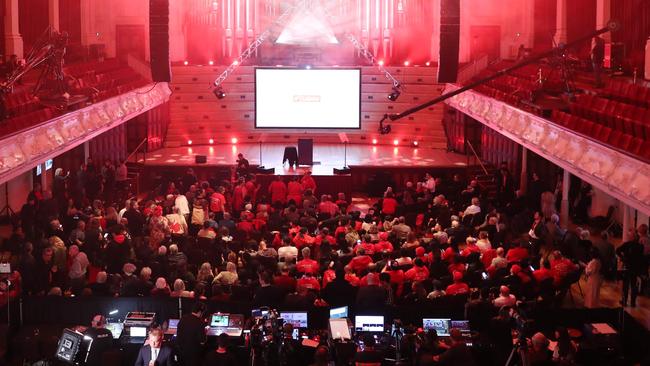
Quite the contrary, in fact. Ardern’s leadership during the COVID-19 crisis — the biggest issue in this election — has earned her the trust of New Zealanders, who do not want a change at the top amid uncertain times.
Yet, when the votes are tallied on Saturday, NZ politics will likely be transformed. That transformation is expected to usher in Labour-Green rule for the first time in the country’s history.
It will also likely bring down the curtain on the political career of 75-year-old Winston Peters — the current Deputy Prime Minister and Foreign Minister — who has been a dominant and seemingly immovable force in New Zealand public life for three decades.
Unless there is an 11th-hour swing against Labour, Ardern is set to retain power, with her party expected to triumph over the Judith Collins-led National Party.
Labour is on course to win its biggest share of votes in 30 years, while National is facing its biggest losing margin in 18 years.
READ Craig’s article in full here
Craig Greaves 6.45pm: National MPs will be updating CVs
With nearly 32 per cent of results counted, Labour is at 50.6 per cent (that’s 66 seats), National at 25.7 (33), the Green Party at 8.2 (11) ACT with 7.6 (10) and NZ First at 2.3 (no seats).
At this time last year National was ahead by 24 per cent, but today many National MPs will be updating their CVs at present.
#BREAKING Battleground seats: National are losing their strongholds . https://t.co/PtLLzMbtgD pic.twitter.com/ydRLIt68ju
— nzherald (@nzherald) October 17, 2020
Craig Greaves 6.35pm: Labour flips National strongholds
Labour is flipping a number of rural seats, historically an electoral stronghold of the National Party.
That’s an amazing result for Labour, which has traditionally struggled to find support in New Zealand’s rural sector.
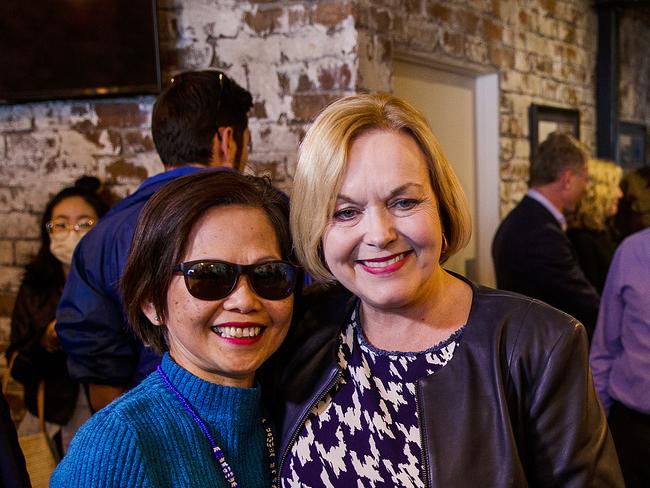
Among those flipping rural seats is Rangitata in the South Island, where Labour list MP Jo Luxon is leading by 4,293 votes, with 35.6 per cent of the vote counted.
The seat has been a National-held seat since it was created in 2008.
Judith Collins has reportedly decided not to speak to journalists tonight – an unsurprising move given what is unfolding.
The National leader will apparently make a speech at around 9pm (NZT) but will not be holding a press conference afterwards.
Craig Greaves 6.30pm: Another veteran National set to lose seat
Long-serving National MP and former cabinet minister Nick Smith has conceded he is unlikely to retain his electorate seat in Nelson after representing the seat since 1996.
With more than 50 per cent of the votes counted, Mr Smith is 4000 votes behind his Labour opponent.
Mr Smith has reportedly told supporters in the crowd: “If I’m brutally honest, we can’t come back from this.”
Blue murder: Gerry Brownlee in early trouble — and so is his partyhttps://t.co/77JeZlrC8c
— nzherald (@nzherald) October 17, 2020
Craig Greaves 6.25pm: National leader struggling to hold seat
So when we said as if things could get any worse for National leader Judith Collins, it just did.
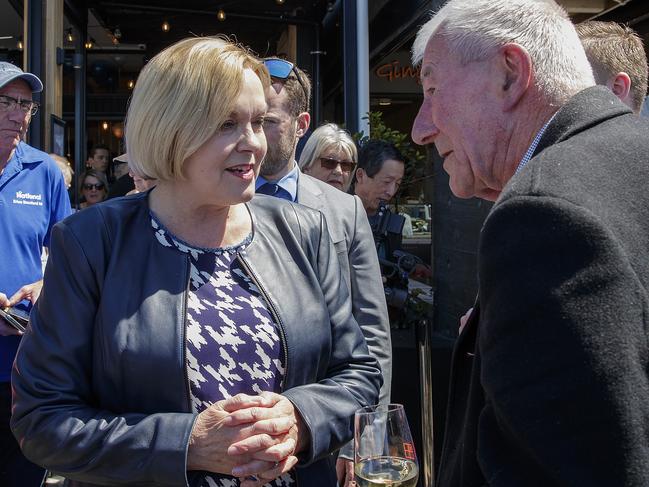
Ms Collins is only holding onto a slim lead in her own Auckland electorate of Papakura.
With just over 14 per cent of the vote counted, Mrs Collins is only ahead of her Labour rival, Labour backbencher and list MP Anahila Kanongata’a-Suisuiki, by 250 votes.
Mrs Collins has been the MP for the Papakura electorate since 2008.
Craig Greaves 6.10pm: National deputy leader at risk of losing seat
As if things couldn’t get worse for National, the party’s deputy leader Gerry Brownlee looks at risk of losing his seat.
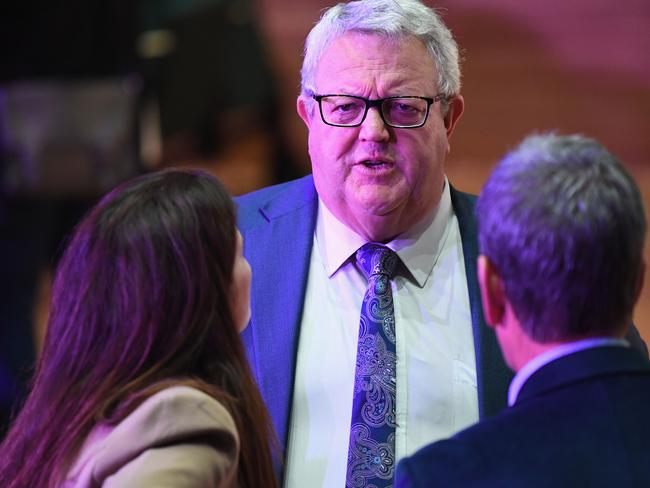
Mr Brownlee, who has been in parliament since 1996, is currently lagging way behind in his Christchurch electorate of Ilam. With just over 15 per cent of the vote counted, he is trailing his Labour rival Sarah Pallett by about 1000 votes.
Mr Brownlee is a former National government foreign minister. At number two on his party’s list, however, he will return to parliament even if he loses his beloved Ilam seat.
But losing it, will be a painful blow for the National stalwart.
Anne Barrowclough 6.00pm: Ardern set for landslide
With nearly 20 per cent of the vote counted, it’s looking like a landslide for Jacinda Ardern, who currently has 50.4 per cent of the vote against a devastating 25.8 per cent for National. This is almost the worst result for the National party in is 84 year history…
Craig Greaves 5.55pm: Left swing, Auckland Central set to turn Green
Though its very early in the count, there are signs of a significant swing to the left.
Labour is surging and is presently hitting over 50 per cent in the party vote. Political ally, the Green Party, is around the 8 per cent mark.
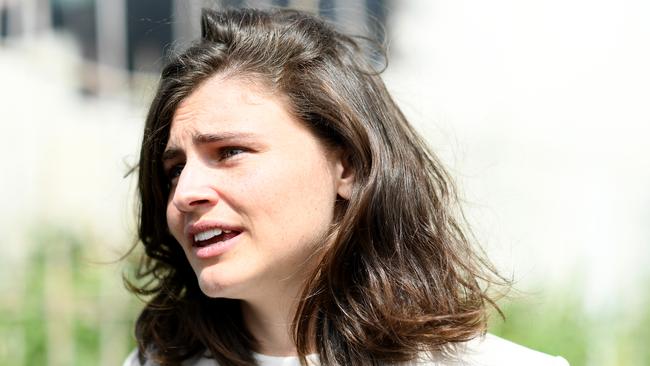
Of particular note is how well the Greens are doing in Auckland Central, where its candidate, MP Chloe Swarbrick, is leading her Labour and National rivals by 400 votes with nearly 30 per cent of the electorate vote tallied.
That’s a National-held seat and Swarbrick’s lead is somewhat surprising. But the wealthy electorate is well populated with urban liberals, so she might be in with a chance.
This might be portent for wider Green success in Auckland
Craig Greaves 5.40pm: Disastrous start for National
It’s a disastrous start for the National.
With about 8 per cent of the vote counted, the opposition party is at just 25.9 per cent. Labour, on the other hand, is at 50.3 per cent.
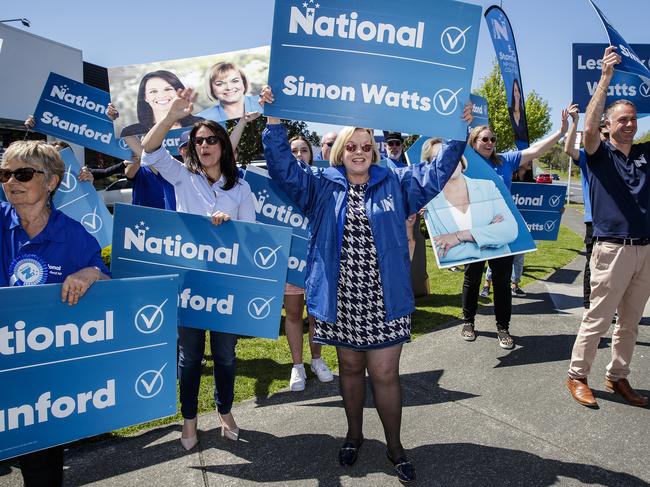
That translates into 34 seats in parliament to Labour’s 65.
It has been reported that only a small number of media and party staffers are the only attendees at the National’s election night HQ at the Royal NZ Yacht Squadron on Westhaven Marina in Auckland.
Perhaps it’s the place to avoid tonight.
Craig Greaves 5.30pm: How Kiwi is that?
Jacinda Ardern’s fiance, Clarke Gayford, has been seen outside the prime minister’s house in Auckland handing out freshly-caught fish sliders and venison bites to awaiting media. So very Kiwi.
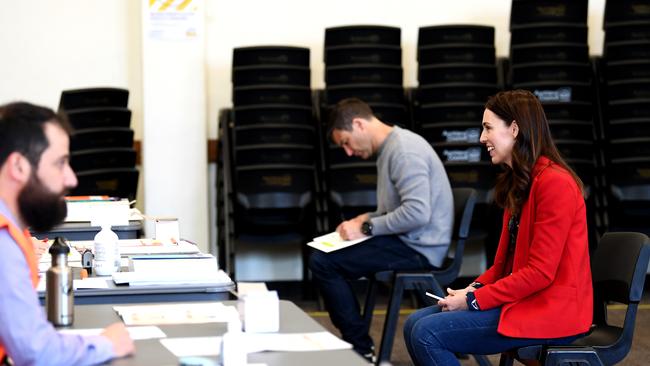
Craig Greaves 5.15pm: First exit polls gives Ardern wide lead
Voting has closed in New Zealand and as crowds gather at the various party headquarters around the country, the first preliminary numbers have rolled in.
With just 1.5 per cent of the total vote counted, Labour is at 50.5 per cent, National at 26.6, ACT with 8.3 and the Greens at 7.0.
Winston Peters’ NZF sits at a miserly 2.3.
It’s a bad result too for National, which has only dropped below 40 per cent twice before – in 2003 and 2007.
Craig Greaves 5.00pm: Northland electorate offers Peters lifeline
The Northland electorate race will be one of the most watched in tonight’s count.
Located in New Zealand’s far north, the electorate offers New Zealand First a potential – albeit tenuous, lifeline.
The party is still polling below the 5 per cent party vote threshold needed to return to parliament, so winning Northland could be its only chance to return to Wellington.
National’s Matt King, who held a slender 1,389 votes over NZ First leader Winston Peters in 2017, currently holds Northland.
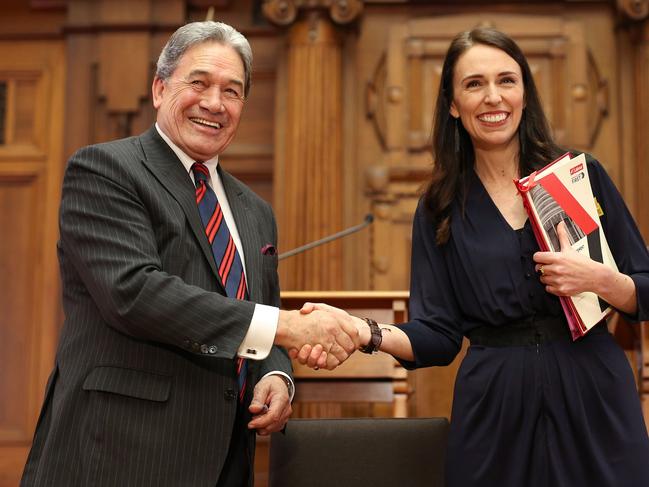
Peters won the seat in a drama-fuelled 2015 by-election, only to lose it two years later. His party’s vote in 2017 was enough to see him back in parliament and back in government with Labour.
High profile cabinet minister Shane Jones – who has strong personal connections in the area- is in the running for NZ First this time round, and the party held early high hopes that he would prevail.
But recent polling has Mr Jones a distant third behind Mr nz King and Labour’s candidate Willow Prime.
It looks like a mountain too steep to climb for Mr Jones, so Mr Peters and his cohorts will likely be crossing respective figures for the party vote to get up further still to the magic 5 per cent.
Craig Greaves 4.50pm: Polls close at 5pm
Polling stations are about to close across NZ, with the first exit polls expected soon after 5pm (AEDT). We should have a firm result by around 6pm.
Craig Greaves 4.40pm: More than half enrolled voters went to polls early
The call by the Electoral Commission to “vote early and vote local” has been heeded with a record of nearly 2 million advance ballots cast for the 2020 election.
The commission today revealed that the final count of advance votes this year came to 1,976,996. In an astonishing late surge, 233,575 people cast their vote yesterday.
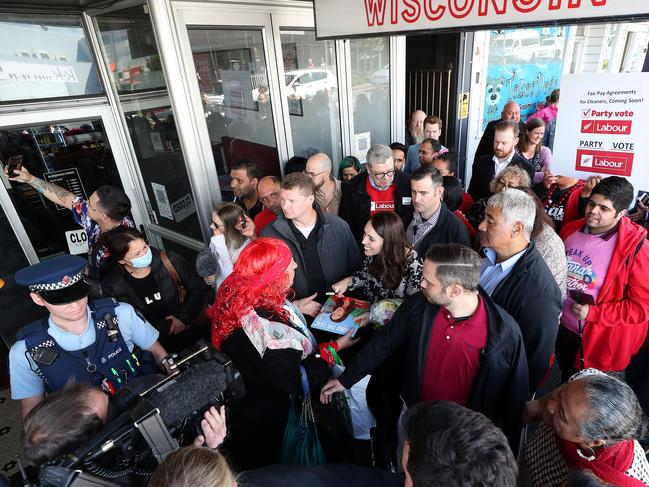
The 2020 tally represents 76 per cent of the total number of votes cast in the 2017 election and a 57 per cent of the enrolled population.
This year’s total easily tops advance voting numbers in prior elections.
Three years ago, advanced votes tallied 1.2 million, while in 2014 the sum was 717,000. Just 334,000 voters cast advance ballots in 2011.
Advance votes are being counted today and the final tally will likely be revealed soon after polls shut at 7pm NZT.
Craig Greaves 4.10pm: Latest poll gives Winston Peters hope
The last major poll before Election Day saw Labour dropping support but just barely securing enough seats to govern alone, while Winston Peters’ prospects of returning to parliament got a boost.
Yesterday’s Newshub-Reid Research poll gave the incumbent Labour Party 45.8 per cent support, a dip of 4.3 points from the last survey. That’s still well ahead of National at 31.1 per cent, which climbed 1.5 points.
From the minor parties, ACT scored 7.4 per cent – a rise of 1.1 points – with the Green Party dropping 0.2 points to 6.3 per cent.
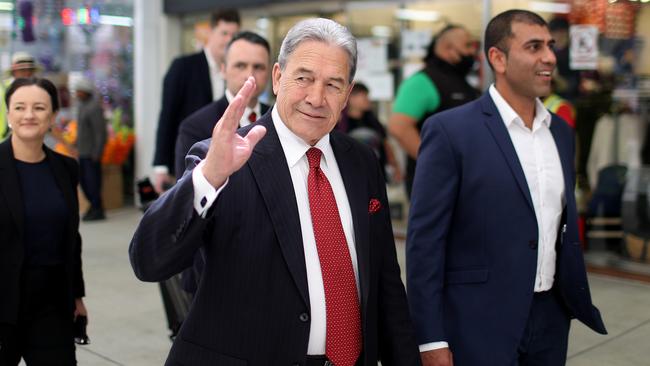
But, most interesting was the 1.6 per cent bump for Mr Peters’ New Zealand First, which landed at 3.5 per cent.
That’s still below the necessary 5 per cent threshold to get back into parliament, but it’s edging closer and it’s the highest polling the party has received since the campaign started in earnest.
Translated into seats in parliament, that gives Labour 61 – the smallest majority possible at only one seat – with National getting 41 seats.
ACT, an ally of National, will be the third biggest party with 10 seats and the Greens retain the same number of seats it currently has at 8.
Mr Peters’ rise in this poll – albeit minor – will be enough to resurrect belief among his faithful supporters that he could yet defy the numerous political obituaries already written about him.
Craig Greaves 3.45pm: Explaining NZ’s complicated electoral system
New Zealand’s electoral system is worth a short tutorial.
New Zealand has since 1996 operated under the Mixed Member Proportional representation system, or MMP for short. Under MMP, New Zealanders get two votes – one for the local MP and one for a political party (two ticks).
The party vote threshold is 5 per cent. A party has to win at least that much or secure an electorate seat to gain a seat in parliament.
If a party secures an electorate seat, it gets allocated a percentage of list seats based on their party vote.
MMP seeks to make sure that people will be represented in parliament both by a person in their electorate, and by a political party.

Votes are translated into the 120-seat New Zealand parliament in two ways. There are 72 electorate seats won by candidates standing in electorate. The remaining 48 are list seats allocated depending on the proportion of party votes won, taking into account the number of electorate seats each party has won.
The proportion of party votes should be roughly equal to the proportion of seats in the parliament.
While electorate MPs are from one party or another, voters need not vote for an electorate representative that corresponds to their party vote. Voters can split their ballots.
Prior to MMP, New Zealand had a basic First Past the Post (FPP) system. Whichever a party won the most seats, won the election and thus formed the government.
At the 1993 general election, a majority of New Zealanders voted for the new MMP system in a binding referendum and the new system was introduced in the next election, in 1996.
At the 2011 election, a referendum was undertaken to test whether MMP was still the preferred way of selecting governments. Around 58 per cent of voters wanted to keep it, up nearly 4 per cent from 1993 binding referendum.
MMP is basically built to prevent the tyranny of the majority government – so to speak.
This means the usual outcomes of MMP elections are coalition governments – in which various parties agree to a combined policy plan – or ones that operate with a confidence and supply agreement. Under the latter, the smaller parties agree to support the larger party on certain policies, but are not obliged to do so on policies that fall outside the agreement.
Craig Greaves 3.40pm: Covid rules at polling stations
New Zealand’s capital Wellington turned a grey and cold day for Election Day as around 2,600 New Zealanders headed to polling stations.
I cast my ballot a primary school in the Wellington suburb of Crofton Downs – my wife’s old school as it happens. The numbers at the voting booth were few as a record number of Zealanders voted early in this election.
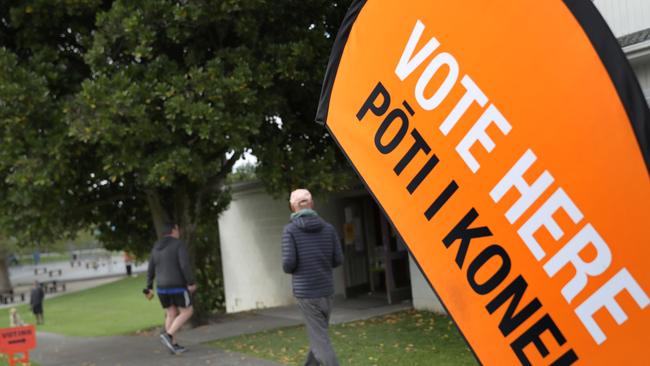
Since advance voting opened on October 2, over 1.7 million people have cast their vote – the most advance votes ever in a New Zealand general election.
Due to COVID-19, there are strictly monitored precautionary health measures in place. Voting officials had hand sanitisers at the ready and keenly patrolled physical distancing between voters. And Kiwis being Kiwis, we followed the rules diligently.
The process is an orderly one and voting took about 15 minutes in all. Each voting place has an observer from one of the main political parties. This booth had one from the opposition National Party, watching proceedings from the edge of the school hall.
Labour Party MP Greg O’Connor currently represents my electorate, Ohariu. At last election in 2017, he held about a 1000 vote margin over his nearest rival, National’s Brent Hudson. The two are facing off again this year, with neither an obvious favourite to win.
Craig Greaves 3.00pm: Ardern predicted to win easily
Polls are predicting a large victory for Labour over its nearest rivals, the opposition National Party led by Judith Collins.
The latest 1 NEWS Colmar Brunton poll – New Zealand’s leading political survey – taken on Thursday, saw Labour on 46 per cent, with National on 31 per cent.
This would make Labour by some distance the biggest party in the next parliamentwith 59 seats, while National gets 40 seats.
Labour needs to win 61 seats of the 120 in parliament to deliver a majority and thus be in position to govern alone. It is more likely, however, the party will fall short of that mark and will reach out to the Green Party to form a coalition government for the next three-year term in office.
The Greens – a current Government support party – and the right wing ACT Party were both on 8 per cent in Thursday’s survey. That will give each 11 seats.
The party of deputy Prime Minister and Foreign Minister Winston Peters, New Zealand First, only received 3 per cent in the poll. Unless the party – a current coalition partner with Labour – gets at least 5 per cent on Election Day, then it won’t return to parliament. The party can also get back in should it win an electoral seat, but that scenario looks to be a remote one.
This is pointing to the likely end to the political career of the 75-year old Mr Peters, one of most influential figures in New Zealand’s modern political history.
Mr Peters has a defied previous predictions of his political demise, and it will be imprudent to write him off even now. But even the party faithful appear to see what’s coming down the pipeline. New Zealand First staffers were reportedly seen holding a number of final farewell functions – or eulogies, perhaps – in parliament this week.
The country, and the watching world, will know the true political fate of Mr Peters and the other contenders later this evening.
Polls close today at 7.00pm (5.00pm AEDT), at which time New Zealand’s Electoral Commission – the independent Crown entity which administers parliamentary elections – aim to start releasing preliminary election results. The first firm results should start coming through by 8.00pm (6.00pm AEDT).
Advance votes were being from counted at 9.00am (7am AEDT).
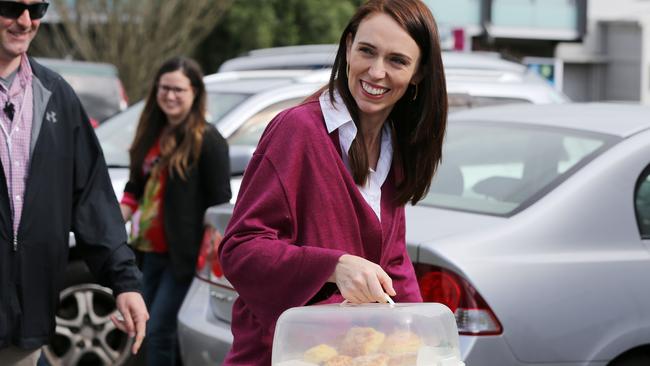
New Zealanders overseas could have cast their ballots from 30 September, while the commission opened advance voting two days earlier on than usual on October 2, in response to COVID-19, and people were encouraged to get out early and vote.
Ardern and Collins led by example and duly voted early.
Ms Ardern and her fiance Clarke Gayford voted on October 3 at the Mt Eden War Memorial Hall voting centre in Auckland, which is located in the Mt Albert electorate. Ms Ardern is the sitting MP for Mt Albert and is standing again in the safe Labour seat.
Mrs Collins voted the next day. She picked a church in which to cast her ballot – the St Thomas Tamaki in the Auckland suburb of Kohimarama. Before doing so, she prayed alone in the church in front of cameras. A self-described practising Anglican, Mrs Collins denied politicising her faith or using her prayer as a stunt.
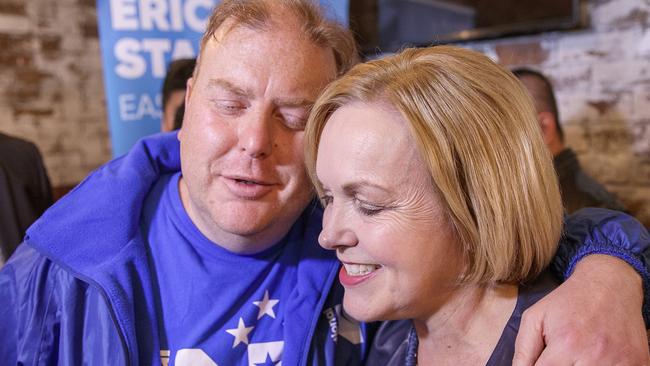
New Zealanders have taken to advancing voting in droves this election year. Since advance voting opened, over 1.7 million people have cast their vote – the most advance votes ever in a New Zealand general election. At the last election in 2017, more than 1.24 million people voted in advance in total.
Under New Zealand’s MMP (Mixed Member Proportional Representation) system, two votes can be cast: for the preferred local candidate and the party of choice.
The commission has also detailed some physical changes the coronavirus will have on voting. There are more voting places to reduce queues, with around 2600 voting stations available for in-person voting. Those voters are encouraged to bring their own pen, use available hand sanitisers and practice physical distancing.
At this year’s general election, New Zealanders can also vote in two referendums; whether to legalise the recreational use of cannabis and the End of Life Choice Act 2019, which would provide people with a terminal illness the option of assisted dying.
Both referendums are optional for voters. The commission will release preliminary results for each on October 30.
For many New Zealanders, this general election was a long time coming. It was originally set for September 19. But confronted with the country’s then intensifying COVID-19 problem, Ms Ardern bowed to pressure from both Mr Peters and Mrs Collins to move it to today.
This has therefore been an especially lengthy, even tiring, election campaign for New Zealanders, who are used to just six weeks of official electioneering. For many fatigued voters, it was a campaign seemingly without end.
But the end is indeed nigh and we’ll know soon enough the result.
The rugby factor
. It is worth noting a popular hypothesis in New Zealand politics that when the All Blacks are doing well come election time, the electorate is happy and tend to vote in favour of the incumbent government.
Last week, the All Blacks staggered to a rare draw with Australia in the first Bledisloe Cup game in the Wellington. Kiwis, unsurprisingly, where less than thrilled at both the performance and the result.
Could this be Labour’s October surprise?



